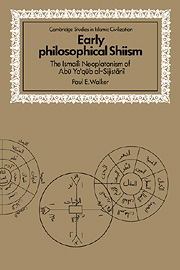Book contents
- Frontmatter
- Contents
- Preface
- Acknowledgments
- Note on transliteration
- List of abbreviations
- PART I AL-SIJISTĀNĪ'S HERITAGE
- PART II AL-SIJISTĀNĪ'S UNIVERSE
- 4 Introduction: categories of thought and terms of analysis
- 5 A theology of unqualified transcendence
- 6 Creation as command
- 7 Intellect, the sum of existent being
- 8 Descending and ascending soul
- 9 Nature and the physical realm
- 10 A cosmic anthropology
- 11 Prophecy, the deputy of intellect
- 12 Interpretation and its institution
- 13 Salvation and the womb of history
- EPILOGUE: THE USE AND CONTROL OF REASON
- Notes
- Select bibliography
- Index
10 - A cosmic anthropology
Published online by Cambridge University Press: 02 November 2009
- Frontmatter
- Contents
- Preface
- Acknowledgments
- Note on transliteration
- List of abbreviations
- PART I AL-SIJISTĀNĪ'S HERITAGE
- PART II AL-SIJISTĀNĪ'S UNIVERSE
- 4 Introduction: categories of thought and terms of analysis
- 5 A theology of unqualified transcendence
- 6 Creation as command
- 7 Intellect, the sum of existent being
- 8 Descending and ascending soul
- 9 Nature and the physical realm
- 10 A cosmic anthropology
- 11 Prophecy, the deputy of intellect
- 12 Interpretation and its institution
- 13 Salvation and the womb of history
- EPILOGUE: THE USE AND CONTROL OF REASON
- Notes
- Select bibliography
- Index
Summary
The human species occupies a position at the very top of the terrestrial realm because it is the culmination of the whole physical world. All earthly existence precedes man and leads to man. The minerals yield to plants which support animals but all finally reach their crowning purpose in the rational animal which is humanity itself. In turn man defines both the summation of physical existence and the advent of spirituality within the natural universe. Therefore, as the focus of the whole, mankind is also a model of it in the sense of being a microcosm, the al-̔ālam al-ṣaghīr. The whole of creation is absorbed in him to the point that nothing is left out. In this he is more than a representative of nature and physical beings since he also contains additional factors that prefigure the whole of spiritual and intelligible existence as well.
Nature has an intimate relationship to man and in a limited way man depends on nature, but the ultimate end of each is radically different. On the relative performance of each, al-Sijistānī offers an interesting comparison. Man, he says possesses the ability to produce a better form than nature can, but he lacks the capacity to provide his product a finer action. al-Sijistānī's anthropology recognizes nature as a necessary base for human life and therefore readily admits the human nature in man. Still ideally, nature serves mankind and not the other way around.
- Type
- Chapter
- Information
- Early Philosophical ShiismThe Isma'ili Neoplatonism of Abu Ya'qub al-Sijistani, pp. 107 - 113Publisher: Cambridge University PressPrint publication year: 1993

